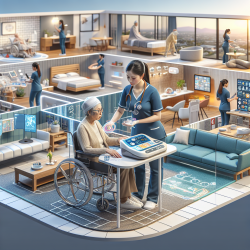In the evolving landscape of healthcare, telehealth has emerged as a critical tool to bridge gaps in access to specialized services, particularly in voice therapy for Transgender and Nonbinary (TGNB) individuals. The research article "Remote Voice Treatment with Transgender Individuals: A Health Care Equity Opportunity" highlights the transformative potential of telehealth in providing equitable healthcare solutions.
Historically, TGNB individuals have faced significant barriers in accessing gender-affirming healthcare services, exacerbated by the social and economic upheavals brought on by the COVID-19 pandemic. A 2020 survey revealed that over 50% of TGNB respondents were at high risk of developing COVID-19 and had restricted access to necessary healthcare services. Telehealth, which has already been successfully implemented in fields like surgery and behavioral health, offers a promising avenue to address these challenges.
Gender-affirming voice therapy is recognized as a crucial need for many TGNB individuals. The World Professional Association for Transgender Health (WPATH) underscores the necessity of such interventions. However, a significant gap exists, with 46% of transfeminine respondents in a large survey indicating they have not yet received behavioral voice therapy but wish to pursue it. This unmet need is particularly pronounced among TGNB individuals living in rural areas, where long travel distances to access care pose additional barriers.
Telehealth can mitigate these geographic barriers by enabling frequent and consistent voice therapy sessions without the need for extensive travel. This approach not only reduces costs related to travel but also enhances safety and comfort for TGNB individuals who may face discrimination in unfamiliar communities. The use of telehealth technologies, such as remote voice recording, holds promise in addressing these barriers effectively.
Beyond geographic challenges, TGNB individuals often encounter social barriers in healthcare settings. Historical marginalization and rigid gender categorizations contribute to a lack of trust in traditional healthcare environments. Telehealth provides an opportunity for TGNB individuals to engage in voice therapy from the comfort of their own homes, fostering a more client-centered approach to care. This can alleviate social anxiety and stress associated with public interactions and healthcare appointments.
Telehealth voice therapy offers unique benefits, particularly for transfeminine patients. Success metrics for voice therapy and surgery often include how patients are perceived while speaking on the telephone. The telehealth format allows for realistic simulations of such scenarios, providing valuable insights for both therapists and patients. Additionally, TGNB individuals are likely to have the necessary technology, such as head-mounted microphones and internet access, to facilitate effective telehealth sessions.
Research validates the use of telehealth for voice therapy, emphasizing the importance of proper recording technology. While head-mounted microphones are ideal, the study acknowledges the practicality of using cell phone microphones positioned correctly. This flexibility makes telehealth a viable option for many TGNB individuals.
In conclusion, telehealth presents a unique opportunity to advance healthcare equity for TGNB individuals by addressing both geographic and social barriers to voice therapy. Further research and implementation of virtual recording technology in voice therapy can not only reduce existing health disparities but also provide critical insights into the broader implications of telehealth in voice care.
To read the original research paper, please follow this link: Remote Voice Treatment with Transgender Individuals: A Health Care Equity Opportunity.










